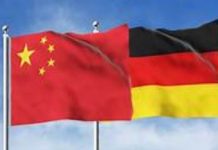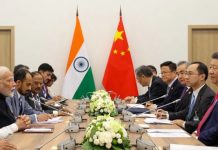By Huan Yuping, People’s Daily
For some time, discussions on the “Global South” have proliferated around the world. The term refers to the whole of emerging economies and developing countries, and mirrors their collective emergence on the international stage.
As profound changes unseen in a century are evolving rapidly in the world today, these discussions signal an intensifying aspiration of these nations for independent development, solidarity, and cooperation. These countries are becoming a non-negligible force in the international landscape.
I.
In the 1950s and 1960s, some countries that had broken free from the shackles of colonialism and embarked on the path of independent development began using the “South” concept to indicate the systemic inequality between developing countries and industrialized countries, or the “North.” Over several decades, the “Global South” has always pursued peace, development, fairness and justice.
The current focus on the “Global South” has its special context. Since the Ukraine crisis escalated, the international community’s attention to peace, security and development has been raised to new heights.
Some major countries in the West are exploiting the crisis to stir up camp confrontation, and continue to pressure countries whose positions differ from theirs. They even attempted to coerce emerging markets and developing countries to pick sides.
Some Western countries frequently wield unilateral sanctions as a weapon, exerting impacts on the stability of global finance, energy, transport and supply chains. This further drags down the struggling world economy.
Facing such a complex and grim situation, emerging markets and developing countries have maintained a rational attitude. They support peace talks, promote dialogue and negotiations to resolve the Ukraine crisis, firmly resist the hegemony of a few Western countries, and explicitly oppose all forms of unilateralism and the forming of blocs and exclusive groups targeted against particular countries.
Recently, the summit of the EU-Community of Latin American and Caribbean States(CELAC) was held in Brussels, Belgium. During the summit, Latin American countries rejected unilateral demands put forward by the EU on issues such as the Ukraine crisis and trade negotiations, insisting on their own reasonable positions.
This once again demonstrated the increasing focus of emerging markets and developing countries on safeguarding their legitimate rights and interests on the international stage, and on gaining a bigger say in the global governance system.
The sobriety demonstrated by emerging markets and developing countries in a volatile world fully demonstrates their rising strategic independence.
Some international observers believe that the world is witnessing a new “non-aligned movement” as more and more countries are refusing to submit to the United States and pick a side.
Former director of Policy Planning for the U.S. Department of State Anne-Marie Slaughter believes that developing countries’ reactions to the Ukraine crisis represent a much bigger shift in the international order than most American and European analysts give credit for.
A Washington Post article wrote that the non-Western world, the long-neglected Southern Hemisphere, or what is usually referred to as “the rest,” is making its voice heard.
The increasing confidence demonstrated by the “Global South” on the international stage highlights the diverse values and interests of the developing world, reflecting the urgent need to safeguard peace and development and defend fairness and justice.
II.
From a long-term historical perspective, the focus on the “Global South” is an inevitable result of the collective rise of emerging markets and developing countries.
During the Cold War, many developing countries had no choice but to survive between the cracks of the two major camps, with no strategic independence to speak of. Today, the “Global South” represents the vast majority of the world’s population and accounts for half of the global economy. It now stands in a completely different historical position, with an even stronger desire for peace, development and cooperation, as well as greater determination for solidarity and self-strengthening. Its ability to resist hegemony and power politics has significantly improved.
Independence is the political foundation of the “Global South.”
Most developing countries had once been invaded, colonized or plundered. They cherish peace and independence. However, power politics and hegemonic practices are disrupting world peace and have become the biggest destructive factors challenging international peace today.
The “Global South” remains highly vigilant about this and jointly opposes all forms of hegemony and power politics, Cold War mentality, camp confrontation, interference in other countries’ internal affairs, and double standards. It plays a crucial role in maintaining world peace and stability.
Development and rejuvenation are the historical mission of the “Global South.”
UN Secretary-General Antonio Guterres cautioned that without fundamental reforms, the richest countries and individuals will continue to pile up wealth, leaving crumbs for the communities and countries of the Global South.
As the global economic recovery lacks momentum, developing countries face particularly daunting development challenges. Standing at a critical juncture of global development, the “Global South” widely believes that the international community should work together to make global development more inclusive, universal and resilient, and accelerate implementation of the UN 2030 Agenda for Sustainable Development.
The world should adhere to win-win cooperation, reject narrow-minded beggar-thy-neighbor and selfish policies, abandon unilateral approaches that monopolize development advantages, safeguard equal development rights for all countries, and promote common development and prosperity.
Equity and justice are the common proposition of the “Global South.”
A few Western countries incite ideological confrontation, form exclusive cliques, undermine international solidarity and impede global cooperation.
The “Global South” generally believes that the international community should unwaveringly uphold the international system with the UN at the core and the international order underpinned by international law.
It holds that state-to-state relations should be coordinated and regulated through proper institutions and rules, and the strong should not bully the weak. Decision should not be made by simply showing off strong muscles or waving a big fist. Multilateralism should not be used as pretext for acts of unilateralism.
The “Global South” rejects the “rules-based international order” hyped and imposed on the developing world by Western countries. It advocates making the international order more just and reasonable, continuing to increase the representation and voice of emerging markets and developing countries, and promoting the building of an equal and orderly multi-polar world.
In recent years, the “Global South” has seen increasing highlights on the international stage.
The 27th session of the Conference of the Parties to the United Nations Framework Convention on Climate Change(COP 27) successfully established a loss and damage fund to provide financial assistance for vulnerable countries hit hard by climate disasters.
Countries including China, South Africa and Brazil are committed to promoting a political settlement of the Ukraine crisis and steadily building international consensus for peace talks.
The Shanghai Cooperation Organization is steadily advancing its membership expansion, with its cooperative philosophy gaining wider influence.
The BRICS countries are exerting growing influence, with more countries applying to join.
The rise of emerging markets and developing countries has not only led to historic changes in the international balance of power, but also brought new ideas about handling international affairs, injecting new vitality into the entire international relations system.
III.
In June this year, South African President Cyril Ramaphosa remarks at the Summit for a New Global Financial Pact deeply resonated with emerging markets and developing countries: African countries “felt like we were beggars when we needed access to vaccines.” He noted that Western countries were hogging vaccines during the COVID-19 pandemic while African countries were helpless when they needed vaccines most.
In February this year, Ghanaian President Nana Addo Dankwa Akufo-Addo also expressed similar disappointment at the Munich Security Conference. He said some Western countries only took care of themselves and disregarded other countries in urgent need of help.
In the eyes of the “Global South,” some Western countries have long dominated international affairs and prioritized self-interests while neglecting their international responsibilities. Facing the increasingly confident “Global South” in strong demand of strategic independence, a few Western countries feel unaccustomed, uncomprehending, and even furious. They have resorted to threats, inducements, and division, which reflects their ignorance of the history of emerging markets and developing countries, their neglect of the realistic needs of the “Global South,” as well as their arrogant and biased detachment from reality.
Since this year, on multiple occasions like the G7 summit and NATO summit, some Western countries have stepped up their empty show of “paying attention” to emerging markets and developing countries. However, the value of such “attention” can only be tested by actions.
If these Western countries really valued the “Global South,” they should not have fueled the flames in Ukraine and caused the crisis to expand and prolong, or even labeled calls for ceasefire from emerging markets and developing countries as “unacceptable.”
They should not have imposed sanctions and “decoupled” when the “Global South” faced development difficulties, which added serious risks to global economic recovery. They should not have paid only lip service without following through on official foreign aid commitments and funding support for developing countries to cope with climate change.
Martin Wolf, chief economics commentator at the Financial Times, pointed out in his article “The west must recognize its hypocrisy,” that many countries view the United States and European major countries as “selfish, self-satisfied and insincere,” and this view makes perfect sense.
The “Global South” should not be an arena for international political rivalry, nor should it become a tool for major power competition and geopolitical games.
If Western countries really value the “Global South,” they should keep pace with the times and adjust their thinking on international affairs. They should earnestly abide by the purposes and principles of the UN Charter, earnestly respect the rights of emerging markets and developing countries to independently make policies and develop, patiently listen to the latter’s demands, and help them develop and address global challenges like climate change.
Singaporean scholar Kishore Mahbubani said, a reality that the West must accept is that the people of non-Western countries, who today comprise almost 90 percent of the world’s population, want a bigger say in global affairs. The world can only make the right decisions to strengthen multilateralism and the international order based on the UN Charter, otherwise “disorder” will dominate the world, he noted.
China is an ex-officio member of the “Global South” and will always be a member of the big family of developing countries. The increasingly louder voice of the “Global South” in international affairs fully demonstrates that the historical trend toward greater democracy in international relations is unstoppable. As emerging markets and developing countries play an increasingly important role in global governance, the forces defending the basic norms of international relations, upholding international fairness and justice, and promoting world peace and development will continue to grow.












